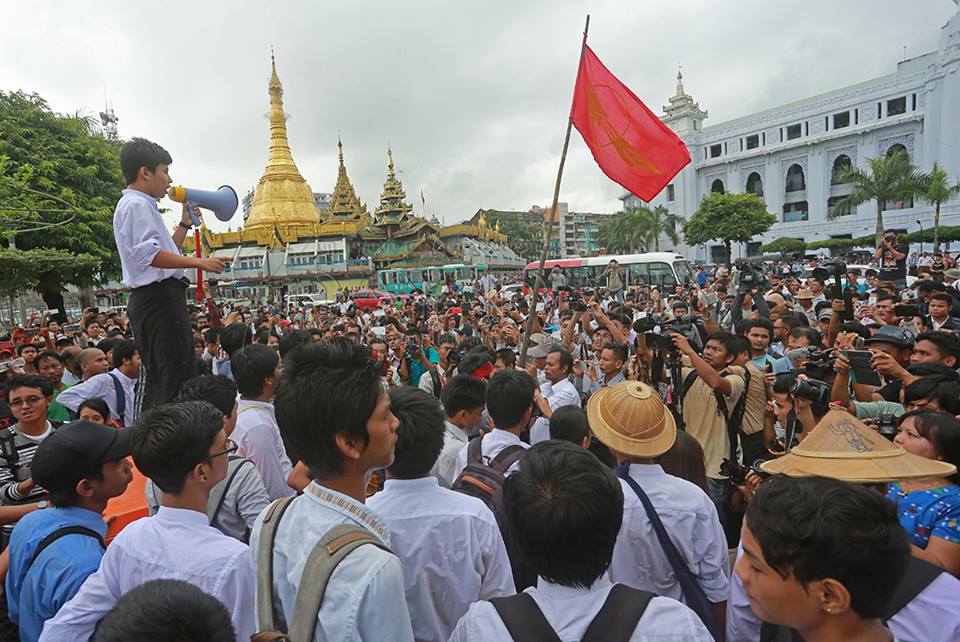Constitutional Crackdown Brings A Dark Day for Democracy in Burma
By Burma Partnership • June 30, 2015 After an increasingly dispiriting start to 2015, and with landmark national elections now likely only five months away, Burma’s flimsy “reform process” is unraveling inexorably. First there was the 10 March crackdown on the nationwide student protest movement at Letpadan, Bago Region; then the Committee to Protect Journalists’ revealed that, despite much-heralded media reforms in 2011, Burma featured yet again in its 2015 rogues’ gallery of top 10 most censored countries on the planet; more recently, the refugee crisis, triggered mostly by severe state and religious persecution of the Rohingya and other Muslim minorities in Arakan State, caught the world’s attention. Meanwhile, grave human rights abuses – including sexual violence – continue unabated in ethnic conflict areas, especially in war-torn Kachin State, parts of northern Shan State and Arakan State, bringing the total number of IDPs in Burma to over 660,000.
After an increasingly dispiriting start to 2015, and with landmark national elections now likely only five months away, Burma’s flimsy “reform process” is unraveling inexorably. First there was the 10 March crackdown on the nationwide student protest movement at Letpadan, Bago Region; then the Committee to Protect Journalists’ revealed that, despite much-heralded media reforms in 2011, Burma featured yet again in its 2015 rogues’ gallery of top 10 most censored countries on the planet; more recently, the refugee crisis, triggered mostly by severe state and religious persecution of the Rohingya and other Muslim minorities in Arakan State, caught the world’s attention. Meanwhile, grave human rights abuses – including sexual violence – continue unabated in ethnic conflict areas, especially in war-torn Kachin State, parts of northern Shan State and Arakan State, bringing the total number of IDPs in Burma to over 660,000.
The elections might have represented a real beacon of hope. If a genuinely democratic movement had taken hold in Parliament, and people were free to vote for whom they wanted, other necessary and progressive steps might have followed. Instead, on Thursday 25 June, Parliament voted against a bill that recommended amending several controversial clauses of the notorious military-drafted 2008 Constitution. Actually – in truth – 67% of Parliament voted in favor of the bill, with only a paltry 33% voting against; however 25% was all that was needed to stave off progressive change. Article 436 stipulates that an eye-watering 75% of Parliament is required to vote in favor of changes to the Constitution, and, unsurprisingly and appropriately enough, this provision was one of the main targets of the amendment bill. Given that the Constitution also reserves 25% of seats in the Parliament for the military, in effect the military has a constitutional veto over any constitutional amendments.
This vote proves that the military is unwilling to change or to relax its relentless grip on power. Two-thirds of Burma’s representatives in Parliament have voted for change, and yet the undemocratic status quo will now be preserved on the basis of a vote that is dictated solely by the military’s rules. Indeed, ignoring the military vote for a moment, almost 90% of the non-military appointees of Parliament voted for constitutional change. Regardless of whether ethnic parties or the main opposition party, the National League for Democracy, win more votes in this year’s national elections, it seems that constitutional change is merely a pipedream while the military continue to occupy 25% of seats in Parliament and any constitutional amendments require more than 75%.
This state of affairs may have some very serious repercussions in the immediate term: Article 59(f) bars Daw Aung San Suu Kyi from becoming President, due to the fact that she has children who are foreign nationals and was also married to a foreign national, and it is as yet unclear how she will respond to the now-certain prohibition on her running as a candidate for the Presidency. Equally, it is unclear how the people of Burma will respond to not being allowed to vote for the likely front-runner for the post.
Furthermore, following Thursday’s vote, several ethnic armed groups voiced pessimistic concerns regarding the negative ramifications that constitutional stalemate would have upon the peace process. Constitutional amendment is essential to agreeing a viable and sustainable political settlement that will be the essential foundation of any peace agreement.
Following this dark day for democracy, in anticipation of both the national elections and of another round of voting on further proposed constitutional amendments, and in light of the various other serious issues troubling Burma, it is essential that the people of Burma and all political parties – including the USDP – have their voices heard in Parliament. It is high time that the country insists upon a reduced political role for the military, for it is starkly clear from last Thursday’s numbers that the military is – bar a handful of other MPs – the primary obstacle to genuine constitutional and democratic reform in the country. Without constitutional change, there will be no democracy or peace in Burma.
Tags: 2008 Constitution, Arakan, Article 436, Article 59f, Burma Partnership, Daw Aung San Suu Kyi, Letpadan, National League for DemocracyThis post is in: Blog
Related PostsMyanmar: Release Four “Rohingya Calendar” Political Prisoners
Burma: Rights Priorities for New Government
Myanmar: Scrap or Amend new Law that could Grant Immunity to Former Presidents
Burma Army Moves to Tighten Grip on Power
Sounds of War Taint the Cheers of Election Success









 All posts
All posts